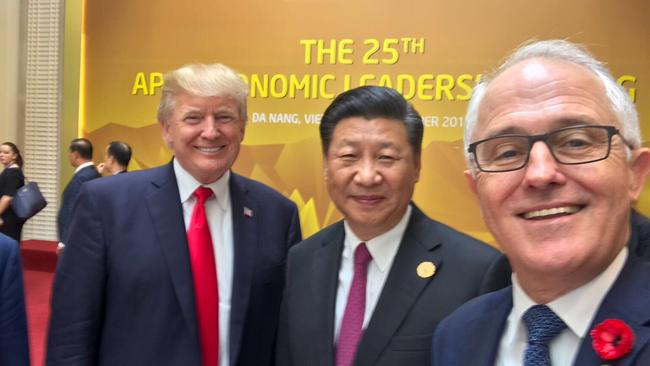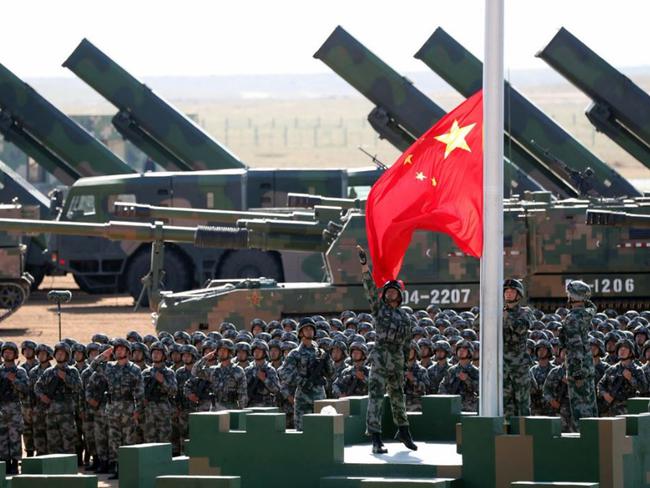China, North Korea: Australia can’t rely on allies for threats
A NEW report outlining the worrying threats facing Australia carries a loud and clear message to the US. But one key word is conspicuously absent.

THEY are the two words missing among thousands in a new foreign policy report which gives a very blunt message to Australia’s biggest ally.
Donald Trump is not mentioned by name in Australia’s foreign policy White Paper, which Prime Minister Malcolm Turnbull will release today.
However the message to United States is loud and clear: the US should maintain its role as a global leader in the region.
“The Government recognises there is greater debate and uncertainty in the United States about the costs and benefits of its leadership in parts of the international system,” the report says.
“We believe that the United States’ engagement to support a rules-based order is in its own interests and in the interests of wider international stability.”
The blueprint, which was last released in 2003, warns Australia is facing a more uncertain future and we can no longer rely on the security of others.
While not specifically mentioning Mr Trump by name, the paper does state the US President is charting a new “America first” course.
It also reveals while the alliance with the US is central to Australia’s approach to the Indo-Pacific, a rising China is reshaping the region.
“Powerful drivers are converging in a way that is reshaping the international order and challenging Australia’s interests,” it says.
“The United States has been the dominant power in our region throughout Australia’s post-World War II history. Today, China is challenging America’s position.”
The foreign policy blueprint also reveals Australia can no longer rely on others for its security as it faces risky and dangerous times.

The Turnbull government’s foreign policy will squarely focus on the Indo-Pacific region while also strengthening and building ties with nations in other regions.
The previous paper was drafted in the wake of the Bali and September 11 attacks.
The latest comes in the context of an “America first” US president, a historic military build-up and economic expansion in Asia, the reshaping of Europe via Brexit and the continuing threat of Islamist terrorism.
“These are the most exciting times, the times of greatest opportunity, but they are also times of uncertainty, of risk, indeed of danger,” Mr Turnbull writes in the introduction to the 122-page paper.
“More than ever, Australia must be sovereign, not reliant. We must take responsibility for our own security and prosperity, while recognising we are stronger when sharing the burden of leadership with trusted partners and friends.”
According to John Blaxland, Professor of International Security and Intelligence Studies and director of ANU’s Southeast Asia Institute, the absence of Mr Trump’s name is hardly surprising.
“The absence of any focus on Trump appears to point to the White Paper’s assessment that the Trump phenomenon is not necessarily an aberration but indicative instead of a broader and perhaps long lasting phenomenon,” he said.
“The paper reflects concern over the American president’s transactional approach to international relations, his distancing from multilateral trade arrangements like the TPP and his inconsistencies over regional security crises and arrangements.”
Prof Blaxland said the combination of factors makes the foreign policy pronouncements all the more important.
“It reflects the passing of the unipolar moment of US hegemony and the emergence of a more unsettled era wherein Australia has to work considerably harder to build relationships and mechanisms that will bolster security and stability and, in turn, provide further opportunities for boosting our economic prospects,” he said.
Dougal Robinson, research fellow at the United States Studies Centre at the University of Sydney, said the paper contains a heavy emphasis on Australia’s values and sovereignty.
Mr Robinson noted the thinly-veiled references to China “undermining international law” through its island-building in the South China Sea, and the Chinese Communist Party’s influence within liberal, democratic Australia.
Mr Robinson said the comprehensive Australian international policy document acknowledged that ongoing US leadership in Asia is far from assured.
“Canberra was shocked by the 2016 election, not only by Hillary Clinton’s loss, but also the success of Donald Trump and Bernie Sanders’ calls for the United States to do less in the world,” he said.
“In response to uncertainty about the United States’ long-term role in Asia, it proposes deeper engagement with three established middle powers in Asia — Japan, India and the Republic of Korea — and a rising power, Indonesia.”
THE KEY OBJECTIVES:
The paper sets out five objectives including:
* Promoting an open, inclusive and prosperous Indo-Pacific region in which the rights of all states are respected;
* Standing against protectionism and promoting business;
* Ensuring Australians are safe, secure and free in the face of threats such as terrorism;
* Promoting and protecting international rules;
* Greater support for the Pacific and East Timor.
On North Korea, the paper urges the “strongest possible economic and other pressure” to stop the rogue state’s “dangerous behaviour”.
“North Korea’s actions underline the importance of the United States’ extended deterrence to Australia’s security and the security of the Republic of Korea and Japan.”
The threat from Islamist terrorism, cyber attacks and transnational crime “could worsen over the decade ahead”, the paper warns, and more work will be needed to strengthen counter-terrorism co-operation in Southeast Asia as foreign fighters return from Iraq and Syria.
However, the risk from direct military threat was “low”.
In the Pacific region, Australia will set three priorities: greater economic co-operation and labour mobility; maritime security; and strengthening people-to- people links, skills and leadership.
Papua New Guinea’s stability and prosperity will be a key focus as the nation struggles to provide basic services to a rapidly growing population.
The lion’s share of the $3.9 billion a year foreign aid budget would be concentrated in the region, based on four tests: the national interest; poverty reduction; leveraging funding from other sources; and results and value for money.
— with AAP



